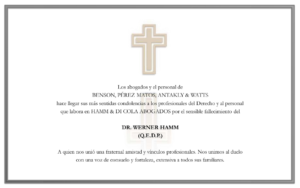BENSON, PEREZ MATOS, ANTAKLY & WATTS
FOUNDED 1953
ATTORNEYS – CONSULTANTS
www.bpmaw.net
Caracas, August 14, 2023
TAX REPORT
ORGANIC LAW FOR THE COORDINATION AND HARMONIZATION
OF THE TAX POWERS OF STATES AND MUNICIPALITIES
The Organic Law for the Coordination and Harmonization of the Tax Powers of States and Municipalities was published in Special Official Gazette No. 6.755, on August 10, 2023. Since, it is an important Law for the business sector; we hereby share the most important points thereof:
1) General Provisions:
The Law begins by establishing some general provisions; some of them are:
- The object is to guarantee the coordination and harmonization of the tax powers of States and Municipalities.
- Besides promoting the harmonic development of the national economy, item 4 establishes the purpose of “creating legal certainty and security on tax procedures and tax burdens applicable at the national territory”.
- Tax principles of equality, justice, fairness, tax capacity, among others are ratified.
- It states that the provisions of the Law are of public interest.
- The supplementary application of the provisions of the Organic Tax Code to the taxes of the states and municipalities is ratified. This ruling is included in Section 1 of the Constituent Mandate in which the Organic Tax Code is ruled.
2) General Rulings for the Exercise of Tax Powers of States and Municipalities:
In this Chapter, some constitutional standards on the tax powers of States and Municipalities are ratified; however, some guidelines on the development thereof are established as well:
- States and Municipalities will coordinate with the respective Ministry competent for finance and economy matters the tax incentives to be applied in their respective territories (Section 9).
- States and Municipalities must identify and suppress the requirements and permits which limit, hinder or are aimed at hindering the exercise and normal development of the economic activity and productive initiative (Section 12).
- All state and municipal taxes, as well as related charges and fines must be paid in bolivares (Section 13).
- The unit of account to calculate taxes, related charges and fines is the exchange rate of the highest value currency published by the Central Bank of Venezuela (Section 14).
- States and municipalities shall follow the margins or limits set forth in the Organic Tax Code to establish fines on tax violations, and to determine and collect interests on arrears (Sections 15 and 16).
- As to the procedures to determine, declare and pay state and municipal taxes, and payments corresponding to registrations, incorporations or requests previously authorized, tax administrations may not request any additional requirements but those stated in the ruling. A simplification of procedures is ordered (Section 17).
- Solvency certificates are forbidden (Section 18). If a requirement has been fulfilled already to comply with a prior procedure, it cannot be requested, whenever it is a requirement for such matter. (Section 19).
- Hiring services for collection management to particular companies or third parties for valuable consideration is possible, provided such circumstance does not imply an addition burden for taxpayers (Section 21).
- The provisions of State laws and municipal ordinances contrary to the provision of this Law shall be null and will not have any effect; the interested person may appeal to the Constitutional Chamber of the Supreme Court of Justice to file the nullity of the aforementioned provision.
3) Measures to coordinate and harmonize the Tax System:
The law sets forth the following measures to coordinate and harmonize the tax system:
- The Fiscal Information Registry Number is the sole identification.
- Declaration and payment measures must be implemented based on information technologies.
- States and municipalities must publish and update the legal rulings in their Webs.
- States and municipalities are prompted to reduce the requirements and demands to taxpayers, by maximizing the use of technological elements.
4) Institutionalism in Tax Coordination and Harmonization matters:
- The higher Tax Harmonization Council is created, formed by the Minister of the People ́s Power competent for economy and finance, the higher authority of the National Integrated Service of Customs and Taxes Administration, three governors and three mayors.
- The duties corresponding to this Higher Council and the Ministry are established, as well as the obligations of states and municipalities, aiming at guarantying the coordination and harmonization of the exercise of tax powers.
5) Tax Harmonization:
a) Harmonization of Business Activity Tax
- This type of tax may not exceed 3 % of the gross income obtained and an annual minimum tax for this tax may not exceed the equivalent in bolivares of 240 times the exchange rate of the highest value currency published by the Central Bank of Venezuela. Exceptionally, the rate for industry, commerce, service or a similar nature will be up to 6.5 % of the gross income obtained in the following branches: 1) exploitation of mines and quarries, 2) service and oil industry, 3) advertising services, 4) retail and wholesale of alcoholic beverages; 5) sale of food, beverages and recreation services; 6) commercial banks, financial institutions, insurances, administrators and similar activities; 7) sale of jewelry, watches and gemstones; 8) production of spirits, tobacco, cigarettes and tobacco products.
- The Ministry of the People ́s Power competent for economy and finance will establish the Harmonized Classifier of Economic Activities
- Economic activities shall be valid for a minimum of 3 years.
- Exemptions may be applied in case of some activities.
- Some reductions to certain types of taxpayers may apply.
b) Harmonization of other state and municipal taxes:
- Cadastral appraisals will be established to assess the value of plots and buildings.
- The Ministry of the People ́s Power competent for economy and finance will set forth an annual applicable Value Rate for cadastral appraisals, cadastral registration, construction permits, occupation certificate, and the assessment of urban and peri-urban property taxes.
- The tax rate on non metallic minerals extraction, exploitation, development and trading, not reserved for the National Executive and which corresponds to the states, will range between 1-20 % of the mineral extraction value per cubic meter. The Ministry of the People ́s Power competent for economy and finance may establish a Value Rate applicable depending on the characteristics of the extracted minerals.
- A maximum limit will be established for the tax of vehicles, depending on the characteristics of each of them, corresponding to the municipalities.
- A maximum limit of one bolivar per one thousand bolivars of state tax is established on credit instruments by banks and other financial institutions. The same limit is established to issue payment orders, checks, transfers and any other means of payment drawn by national, state, district and municipal institutions or bodies of the public sector; the aforementioned will be made as advanced, partial payments or total contractors’ payments.
- The creation of a favorable ecosystem to develop new entrepreneurships is created, so the sum of all municipal taxes applicable to entrepreneurs does not exceed 1% of the annual gross incomes obtained by taxpayers. Municipalities are encouraged to create a simplified tax system for entrepreneurs.
c) Harmonization of rates:
- Rates to be collected by states and municipalities and the limit thereof is established. The Ministry of the People ́s Power competent for economy and finance will establish annually the Value Rate applicable to the rates within the limits set forth herein.
d) Harmonization of official paper, revenue stamps and fiscal stamps:
- To collect these items, burdens implying double taxation should be avoided.
- States must implement an electronic revenue stamp.
- Limits are established on these items ranging between 10 and 500 times the official exchange rate of the rate of the highest value currency published by the Central Bank of Venezuela, depending on the person who carries out the procedure or petition.
6) Temporary, repealing and final provisions
- States and municipalities shall have a ninety consecutive day period after the publication of this Law in Official Gazette to adequate the current tax legal instruments.
- The provisions of state laws and municipal ordinances which include taxes different to the ones established in the Constitution and of the present Law, as well as to other provisions contrary to the Law are hereby revoked.
- From the publication of this Law in Official Gazette, Sections 27, 28, 29 (referred to the creation of the Higher Tax Harmonization Council and the responsibilities thereof); 32 (the competence of the Ministry of the People ́s Power competent for economy and finance to establish the Harmonized Classifier of Economic Activities); 37 (the competence of the Ministry of the People ́s Power competent for economy and finance to establish the applicable Value Rate for cadastral appraisals and others), 44 and 45 ( the competence of the Ministry of the People ́s Power competent for economy and finance to establish the value rate for entrepreneurs and those who cannot pay taxes under the simplified system), as well as the responsibility of the Ministry of the People ́s Power competent for economy and finance to issue the value rates referred to in Sections 38, 39 and 49 of the Law shall enter into force.
Should you need more information, please contact us.
Cordially Yours,
BENSON, PÉREZ MATOS, ANTAKLY & WATTS
Ysabel Figueira
All rights reserved. This document is a contribution of BENSON, PEREZ MATOS, ANTAKLY & WATTS to its clients on legal matters of their interest, aiming at counseling on the matter under discussion. It must not be construed as a specific legal opinion. The information contained herein may not be distributed without the express consent of this Law Firm.



